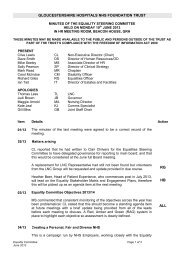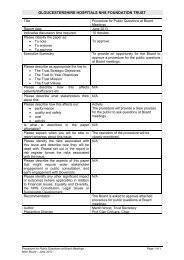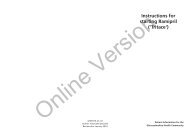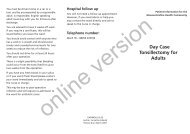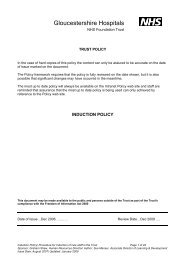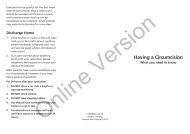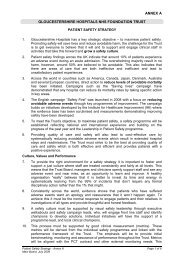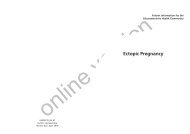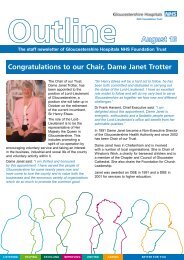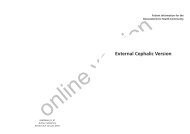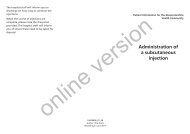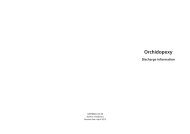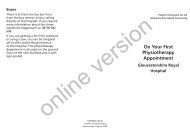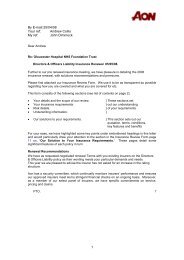Cardiac Rehabilitation After Your Heart Attack - Gloucestershire ...
Cardiac Rehabilitation After Your Heart Attack - Gloucestershire ...
Cardiac Rehabilitation After Your Heart Attack - Gloucestershire ...
You also want an ePaper? Increase the reach of your titles
YUMPU automatically turns print PDFs into web optimized ePapers that Google loves.
C a r d i a c R e h a b i l i t a t i o n<br />
Online Version<br />
a f t e r y o u r h e a r t a t t a c k<br />
The printing of this book has been sponsored by an educational grant from Pfizer.<br />
G l o u c e s t e r s h i r e H o s p i t a l s N H S T r u s t<br />
GHPI0128/07/03<br />
Contact: <strong>Cardiac</strong> <strong>Rehabilitation</strong> Unit<br />
Review due: September 2004
a f t e r y o u r h e a r t a t t a c k<br />
The printing of this book has been sponsored by an educational grant from Pfizer.<br />
Online Version<br />
2433
a f t e r y o u r h e a r t a t t a c k<br />
a f t e r y o u r h e a r t a t t a c k<br />
Summary<br />
This booklet is designed to give you general guidance on recovering from your<br />
heart attack. You should receive more specific advice during your hospital stay. If<br />
you would like more specific advice following your return home, please contact<br />
the rehabilitation nurse.<br />
Acknowledgements<br />
This booklet was first produced by the <strong>Gloucestershire</strong> <strong>Cardiac</strong> <strong>Rehabilitation</strong><br />
Team in 1999 and has been updated annually since. It was last updated in<br />
September 2003. The information reflects the latest research evidence and<br />
guidelines.<br />
Written and produced by<br />
<strong>Gloucestershire</strong> <strong>Cardiac</strong> <strong>Rehabilitation</strong> Team<br />
Contributions to this booklet have been made from cardiac rehabilitation team<br />
members past and present.<br />
<strong>Gloucestershire</strong> Hospitals NHS Trust. September 2003.<br />
Contents<br />
1 Contents<br />
2 Introduction<br />
3 What is a heart attack?<br />
5 What is angina?<br />
6 What to do if you think you’re having angina<br />
7 <strong>Cardiac</strong> rehabilitation<br />
8 Risk factors for coronary heart disease<br />
9 Making changes<br />
11 Smoking<br />
12 Hypertension<br />
13 Cholesterol<br />
14 Guidelines for a healthy heart<br />
16 Weight<br />
17 Alcohol<br />
18 Exercise<br />
20 Stress<br />
22 The first few weeks at home<br />
24 The next few weeks – getting back to ‘normal’<br />
24 Driving after a heart attack<br />
25 Resuming your sex life<br />
Online Version<br />
26 Back to work<br />
27 Going on holiday<br />
28 Take regular exercise<br />
29 Thoughts and feelings<br />
31 Medication<br />
32 Summary<br />
32 Acknowledgments<br />
24 32<br />
241
a f t e r y o u r h e a r t a t t a c k<br />
a f t e r y o u r h e a r t a t t a c k<br />
Introduction<br />
This booklet has been written by the <strong>Gloucestershire</strong> <strong>Cardiac</strong> <strong>Rehabilitation</strong><br />
Team. It aims to give you the information you need to help you make the best<br />
possible recovery after your heart attack. It should answer many of the questions<br />
that you may have. The information contained reflects the latest evidence<br />
available to help you make informed choices about your recovery.<br />
During your hospital stay the ward nurses and members of the cardiac<br />
rehabilitation team will advise you further.<br />
This booklet is designed to give you guidance for the first few weeks following<br />
discharge from hospital. There is a lot of information, so you may want to read<br />
it over a period of time. You can take this booklet home with you and refer to it<br />
over the next few weeks.<br />
If you have any questions about your rehabilitation once you are home, you can<br />
contact the rehabilitation nurse who will be happy to discuss your concerns.<br />
<strong>Your</strong> <strong>Cardiac</strong> <strong>Rehabilitation</strong> Nurses are:<br />
Cheltenham General Hospital<br />
Alison Anderson<br />
Catherine Fern<br />
Phone 08454 223535<br />
<strong>Gloucestershire</strong> Royal Hospital<br />
Julia Harrison<br />
Chrissie Jones<br />
Phone 08454 226893<br />
Online Version<br />
Medication<br />
Following a heart attack, you will be prescribed medication to reduce your risk<br />
of having another cardiac event. This is called secondary prevention medication.<br />
You will get the benefits for as long as you take them, so you may be on these<br />
for life. These medications include Aspirin, Beta Blockers, ACE Inhibitors and<br />
Cholesterol Lowering Medication. Even when you feel better you will still benefit<br />
from taking these medications.<br />
Preventative medication<br />
Aspirin<br />
Aspirin reduces the risk of your blood clotting in the narrowed blood vessels<br />
supplying your heart muscle. You should take your aspirin with food to reduce<br />
the risk of it causing irritation to the lining of your stomach.<br />
Beta Blocker<br />
Beta blockers reduce your blood pressure and heart rate and therefore reduce<br />
the amount of work that your heart has to do.<br />
Cholesterol lowering drug (Statin)<br />
Statins will lower your cholesterol level. Whilst on this medication you will need<br />
to have a blood test every year to check your liver function. You should report<br />
any signs of muscle fatigue, weakness or pain to your doctor as this can be a side<br />
effect of the medication and will need to be investigated if it occurs.<br />
ACE Inhibitor<br />
This drug helps to reduce the workload that your heart has to cope with.<br />
You may be prescribed a number of other medications in addition to these to<br />
control any symptoms you may have. The most common of these is a Nitrate.<br />
Symptom Control Medication<br />
Nitrate<br />
Nitrates relax your coronary arteries and allow the blood to reach the heart<br />
muscle more easily. They also help to reduce the workload of the heart. Nitrate<br />
tablets may be prescribed regularly to prevent angina attacks. <strong>Your</strong> GTN spray is<br />
a nitrate. It works the same way as the tablets but gives you a smaller dose very<br />
quickly, to relieve angina symptoms when they occur.<br />
It is important that you understand what medications you are taking and<br />
why you are taking them. If you are unsure, please ask your doctor, nurse or<br />
pharmacist.<br />
24 2 24 31
a f t e r y o u r h e a r t a t t a c k<br />
a f t e r y o u r h e a r t a t t a c k<br />
What can I do about these feelings?<br />
Try and get them in perspective: sudden feelings of sadness happen to most<br />
people, they almost always fade over time. If they only happen occasionally, and<br />
most of the time you feel OK, it is best to accept them as part of getting better.<br />
It is a stage that most people have to go through. Remind yourself that although<br />
the sadness is unpleasant it is not dangerous.<br />
Feeling anxious<br />
The next time you feel anxious or upset, note what you are thinking. Write down<br />
the thoughts.<br />
Look at your thoughts and try to identify whether any action can be taken<br />
to sort them out. For example, worrying about whether your car is going<br />
to break down could be reduced by getting the car serviced and joining a<br />
breakdown service.<br />
Next, try to substitute more reasonable objective thoughts, e.g. tell yourself<br />
you are unlikely to break down as you have just had your car serviced, and<br />
if you did, the breakdown service would get you to your destination, and<br />
provide you with a hire car until the problem is solved.<br />
It may help to imagine what someone else might say or think, someone<br />
reassuring.<br />
The aim of this exercise is not to stop having negative thoughts, but to be less<br />
worried by them and to find ways of reducing their power by challenging them<br />
with alternative ways of viewing the situation.<br />
Think positively: don’t let negative thoughts stop you appreciating the positive<br />
things in your life.<br />
What is a heart attack?<br />
(The medical term for a heart attack is a myocardial infarction, or MI)<br />
Online Version<br />
<strong>Your</strong> heart is a large, hollow muscle, which continuously pumps blood around<br />
the body. The heart muscle needs its own blood supply to work properly. The<br />
coronary arteries carry blood (and therefore oxygen) to your heart muscle.<br />
Coronary artery<br />
(Fig. 1. <strong>Heart</strong> and coronary arteries)<br />
Over a period of time, usually many years, the coronary arteries can become<br />
narrowed. They are usually narrowed because "fatty deposits" (atheroma) are<br />
laid down in the lining of the coronary artery. This process is called coronary heart<br />
disease.<br />
Fatty deposits<br />
(Fig. 2. Coronary arteries with 'fatty deposits')<br />
When you have a heart attack, one of these fatty deposits breaks open and a<br />
blood clot forms over it, blocking your coronary artery. If one of your coronary<br />
arteries is blocked, an area of your heart muscle does not get any blood or<br />
oxygen and is permanently damaged. This is what was happening when you<br />
experienced your symptoms of a heart attack.<br />
24<br />
30<br />
24 3
a f t e r y o u r h e a r t a t t a c k<br />
a f t e r y o u r h e a r t a t t a c k<br />
Blood clot<br />
(Fig. 3. Blood clot formed over ruptured 'fatty deposit')<br />
When you came into hospital you may have been given a drug to dissolve the clot<br />
and allow the blood supply back to your heart muscle. This type of ‘clot busting’<br />
drug is called Streptokinase or TPA. You would have been assessed individually as<br />
to whether these drugs were appropriate for you.<br />
blocked coronary artery<br />
damaged heart muscle<br />
(Fig. 4. Blocked coronary artery and area of damaged heart muscle)<br />
Usually a heart attack causes severe chest pain but occasionally people can have a<br />
heart attack and experience very little pain at all. By the time you read this book<br />
the doctors will have confirmed that you have had a heart attack.<br />
Thoughts and feelings<br />
Online Version<br />
The way we think is important in determining how we feel. Feeling anxious<br />
or miserable is often accompanied by negative thoughts. Challenging these<br />
thoughts is an important first step in managing negative feelings.<br />
Feeling fed up<br />
Feeling fed up or sad is common after a heart attack. These feelings usually go as<br />
time passes. They can range from the occasional feeling of sadness or tearfulness<br />
to absolute despair. All these symptoms are common:<br />
Loss of interest in things that Tearfulness<br />
were once enjoyable Poor appetite<br />
Sadness No energy for doing things<br />
Early waking Loss of interest in appearance<br />
These symptoms are unpleasant, not dangerous. However, if they interfere with,<br />
or take over your life, they are called depression. Depression affects the way you<br />
think, you can only see the bad side of things. Previously enjoyable things can<br />
seem flat and dull. It is all too easy to imagine the worst when you are depressed.<br />
For example:<br />
"I’ll probably have another heart attack."<br />
"I’ll never work again."<br />
"This will last forever."<br />
The chances are that none of these things will happen. If you are feeling<br />
depressed, the slightest setback or difficulty may lead to thoughts of complete<br />
disaster.<br />
24 4<br />
29<br />
24
a f t e r y o u r h e a r t a t t a c k<br />
a f t e r y o u r h e a r t a t t a c k<br />
<strong>After</strong> the first few weeks at home<br />
Over the last 6 – 8 weeks you should have been gradually increasing your<br />
activity. For most people now is the time to begin regular exercise. The cardiac<br />
rehabilitation programme aims to help you with this and other aspects of your<br />
recovery and you are encouraged to attend. If you have not been given a date to<br />
start, please contact your cardiac rehabilitation nurse.<br />
What sort of exercise is best?<br />
<strong>Your</strong> exercise should be Aerobic. Good examples of aerobic exercise include:<br />
walking, cycling, swimming and dancing.<br />
What is enough exercise?<br />
Research shows that you need a minimum of 20 minutes of moderate aerobic<br />
exercise, five times a week to obtain the best benefits. We recommend daily<br />
exercise whenever possible. The 20 minutes does not include the warm up and<br />
cool down. Pace yourself and gradually work up to the 20 minutes. It may take<br />
some weeks before you reach this level.<br />
Warming up and cooling down<br />
Warm up<br />
This should last at least 10 minutes and should consist of gentle exercises or slow<br />
walking, gradually increasing in intensity. The warm up will prepare you for<br />
exercise by:<br />
Gradually increasing your pulse and breathing rates<br />
Enabling you to do more exercise before you feel tired<br />
Reducing your risk of having angina. If you are prone to angina, you should<br />
find with a proper warm up you are able to do a lot more before the angina<br />
starts<br />
Cool down<br />
This should last 5-10 minutes and consist of gentle exercises or slow walking<br />
gradually decreasing in intensity. The cool down will:<br />
Allow your pulse and breathing rates to gradually slow down and return to<br />
normal<br />
Reduce the chances of you feeling stiff or aching after you exercise<br />
If you have been exercising and stop suddenly without cooling down you may<br />
feel dizzy and faint.<br />
24 28<br />
Online Version<br />
What is Angina?<br />
Angina is the name for the symptoms experienced when your heart muscle is not<br />
getting enough oxygen and blood to meet its requirements. This usually occurs<br />
when "fatty deposits" (atheroma) are laid down in the lining of the coronary<br />
artery slowing the flow of blood to your heart muscle. Both angina and a heart<br />
attack are symptoms of coronary heart disease but not everyone who has a heart<br />
attack will have angina. Having angina does not mean that you will have another<br />
heart attack.<br />
How do I know if I have angina?<br />
The symptoms of angina vary for each person. There are a number of factors<br />
which might suggest that the pain or discomfort you are feeling is angina. While<br />
it is important that you never ignore chest pain, or discomfort, it is sensible to<br />
consider other causes such as indigestion or muscle pains.<br />
The points below should help you to decide:<br />
Angina can be triggered by physical exertion, emotional upset or cold<br />
weather.<br />
If angina is triggered by exertion it is often eased by rest.<br />
Angina is often but not always felt across the chest.<br />
Angina is commonly described as a discomfort, ache, tightness, heaviness,<br />
pressure or burning sensation around the chest area. It is not always a pain.<br />
You may have pain or discomfort in the neck or throat or down one or both<br />
arms. This may be in addition to chest discomfort or these may be your only<br />
symptoms of angina.<br />
The feeling may be like indigestion and be experienced in the upper part of<br />
the abdomen. The symptoms may be similar to the pain you experienced<br />
when you had your heart attack, but less severe.<br />
If the pain or discomfort is eased by GTN spray, it is most likely to be angina.<br />
GTN spray doesn’t usually help any other kind of chest pain.<br />
What to do if you think you are experiencing angina<br />
You will need to see your GP if you experience any new symptoms which you<br />
think may be angina or if your existing angina starts to become more frequent.<br />
Keep a diary of the pain / discomfort you experience, what you were doing at the<br />
time, how long it lasted, and what you did about it. This will help you and your<br />
doctor decide if the symptoms you are experiencing are angina or something<br />
else.<br />
Angina does not damage your heart muscle in the same way that a heart attack<br />
does. Angina symptoms mean that your heart is not getting as much blood and<br />
oxygen as it needs. <strong>Your</strong> GTN spray will help by relaxing your coronary arteries<br />
and letting the blood flow to the heart more easily.<br />
24<br />
5
a f t e r y o u r h e a r t a t t a c k<br />
a f t e r y o u r h e a r t a t t a c k<br />
What to do if you think you’re having angina<br />
Sit down if possible<br />
(If you have been exercising, keep your feet moving)<br />
Try taking a couple of deep breaths and try to relax<br />
Use your GTN spray/tablet as directed. (Usually two sprays under your tongue)<br />
If the symptoms haven’t eased within 5 minutes, take your GTN spray/tablet<br />
again<br />
If the symptoms haven’t eased after another 5 minutes, take your GTN spray/<br />
tablet a third time<br />
If after 15 minutes you still have chest pain/discomfort and you’ve had no relief<br />
from your GTN spray/tablets, dial 999 and ask for an ambulance.<br />
DON’T DELAY<br />
If you think you’re having another heart attack dial 999,<br />
Online Version<br />
Going on holiday<br />
There is no reason why you should not enjoy a holiday after a heart attack.<br />
Remember to pace yourself. You may gain confidence to tackle longer journeys<br />
by having a short break first.<br />
Planning<br />
Planning is the key to a successful holiday. Plan your journey to allow for rest<br />
breaks and plenty of time to reach your destination. You may consider stopping<br />
overnight to break up a long journey. Ensure you have enough medication to last<br />
the whole holiday. It may be useful to keep a written list of what medication you<br />
are taking – you should be able to get a printed list from your pharmacist. It may<br />
help to write a list of all the things you need to do or pack for your holiday so<br />
that there are no last minute hitches.<br />
If you have a holiday booked please discuss this with the cardiac rehabilitation<br />
nurse who can advise you further.<br />
Flying<br />
There is no reason why you shouldn’t fly after a heart attack. Most airlines insist<br />
you wait at least 3 weeks. Please check with the individual airline.<br />
Holiday insurance<br />
It can be difficult to get reasonably priced holiday insurance following a heart<br />
attack. It is possible but you may need to shop around extensively. <strong>Your</strong> cardiac<br />
rehabilitation nurse can provide more information if you require this.<br />
24 6 27 24
a f t e r y o u r h e a r t a t t a c k<br />
a f t e r y o u r h e a r t a t t a c k<br />
Back to work<br />
<strong>After</strong> your heart attack, many factors will determine how soon you return to<br />
work. These include the type of job you do, the hours you work, your physical<br />
and psychological recovery. The ‘right’ time to return to work is very individual<br />
and you should be honest with yourself and your employers about how you are<br />
recovering.<br />
We recommend at least six weeks off work. Many people find they need longer<br />
than this. It is advisable to discuss your return to work with your employer well<br />
in advance. This will not only help you to prepare but will help your employer to<br />
plan for your return and provide any support necessary. As with everything else<br />
it is advisable to pace yourself where possible. One example is to return to work<br />
for a couple of days a week at first, or to work shorter days for the first couple of<br />
weeks. You will obviously have to negotiate this with your employer.<br />
If your employer would like any more information or advice on supporting your<br />
return to work, ask them to contact the cardiac rehabilitation nurse.<br />
If your job is physically demanding, you can use your time off work to increase<br />
your activity and exercise levels gradually, to help prepare for your return to<br />
work. Remember that pacing is the key to a successful return to work. Even a<br />
less physically demanding job can be tiring and stressful. Remember your stress<br />
management and relaxation techniques. For more specific advice please speak to<br />
your cardiac rehabilitation nurse.<br />
Money Matters<br />
If you would like advice about money matters while you are off work, and any<br />
money you may be entitled to, you can contact the social services help desk on<br />
01452 426868 for more information.<br />
Online Version<br />
<strong>Cardiac</strong> rehabilitation<br />
Having a heart attack is a very stressful event for you and your family. It<br />
has an effect on the things you do and the way you think and feel. <strong>Cardiac</strong><br />
rehabilitation aims to give you all the information and support you need to<br />
make the best possible recovery. You will be seen in hospital by the cardiac<br />
rehabilitation nurse who will discuss your initial recovery with you and your<br />
family and help prepare you for the first few weeks at home.<br />
What is the <strong>Cardiac</strong> <strong>Rehabilitation</strong> Programme?<br />
The cardiac rehabilitation programme consists of 7 weekly sessions, each lasting 2<br />
hours. Most people are ready to start about 4 - 8 weeks after their heart attack.<br />
You will be with a group of about 10 people who have had a heart attack or<br />
heart surgery. You are welcome to bring your partner or a friend if you wish.<br />
Each week you will be advised by an exercise professional, psychologist and nurse<br />
on all aspects of recovering from a heart attack. The dietitian will attend one<br />
session.<br />
You will be given the most up to date information and have the opportunity<br />
to discuss your progress. You will also have the opportunity to take part in<br />
supervised exercise sessions. We know from research, that following cardiac<br />
rehabilitation, people are able to do more, feel less stressed and enjoy a healthier<br />
lifestyle. It is possible for you to reduce your risk of having another heart<br />
attack and it is possible to improve how well your heart muscle works. <strong>Cardiac</strong><br />
<strong>Rehabilitation</strong> aims to give you evidence based information to help you do this.<br />
How do I join?<br />
A member of the cardiac rehabilitation team will explain the rehabilitation<br />
programme in more detail. You are encouraged to attend the programme which<br />
is specifically for people like yourself.<br />
If you agree to join the programme, you will receive your invitation,<br />
questionnaire and more details about the programme approximately two weeks<br />
before you are due to start.<br />
If you have any concerns at all, please don’t hesitate to discuss them with the<br />
cardiac rehabilitation nurse.<br />
24 26<br />
247
a f t e r y o u r h e a r t a t t a c k<br />
a f t e r y o u r h e a r t a t t a c k<br />
Risk factors for coronary heart disease<br />
Risk factors are things that we know will make you more likely to have a heart<br />
attack. Risk factors are often related to your lifestyle and are therefore in your<br />
control. You can do something about them.<br />
Risks you can change<br />
Risks you can’t change<br />
smoking age<br />
high blood pressure family history<br />
high cholesterol levels gender<br />
lack of exercise<br />
prolonged stress<br />
obesity<br />
diabetes<br />
excess alcohol<br />
You may want to tick the ones that apply to you. If you have any of the risk<br />
factors that you can’t change it is even more important to look at the ones you<br />
can change.<br />
By adopting a healthy lifestyle and reducing your risk factors you can greatly<br />
reduce your chances of having another heart attack.<br />
Having more than one risk factor doesn’t just double the risk of having another<br />
heart attack. For example, smokers with high blood pressure and high cholesterol<br />
levels are eight times more likely to have a heart attack than a non-smoker with<br />
normal blood pressure and cholesterol. Reducing one risk factor can have great<br />
benefits and with time, reducing as many risk factors as you can, will give you the<br />
best chance of making a full recovery.<br />
People with diabetes have an increased risk of developing coronary heart disease.<br />
It is particularly important that your diabetes is well controlled and that you<br />
reduce any other risk factors you have. Ask your cardiac rehabilitation nurse for<br />
more specific advice.<br />
Making changes in your lifestyle can be stressful. Before you make any changes<br />
read the next section for further advice.<br />
Online Version<br />
Resuming your sex life<br />
Sex is an important part of life for many people. It should continue to be so after<br />
a heart attack. During sexual intercourse your heart rate and blood pressure rise,<br />
as they do with any other form of exercise. The rise in blood pressure and heart<br />
rate during sexual intercourse with your usual partner is roughly equivalent to<br />
that experienced when climbing two flights of stairs or walking a mile at an easy<br />
pace!<br />
Having a heart attack is a very stressful event for you and your partner. Resuming<br />
sexual activity may be the last thing on your mind or it may be very important for<br />
you. It is natural to have concerns and it is important for you and your partner to<br />
discuss your feelings and to share any worries you may have.<br />
Approach your return to sexual activity the same as with any other exercise and<br />
pace yourself. You may wish to regain your confidence and closeness by kissing<br />
and cuddling, and progress from there when you feel ready. Some points you<br />
may want to consider when resuming sexual activity:<br />
Make sure you feel relaxed beforehand but not too tired<br />
Familiar surroundings may help you to feel more relaxed<br />
Make sure your bedroom is not much colder than the rest of the house<br />
Avoid sexual activity immediately after a heavy meal or after drinking more<br />
than a couple of units of alcohol.<br />
Impotence<br />
Impotence can sometimes be a problem after a heart attack. The stress of having<br />
a heart attack may be the reason for this. It can however, be a side effect of<br />
a type of medication called a beta blocker, which is commonly prescribed. If<br />
impotence is a problem for you, please discuss this with your doctor or cardiac<br />
rehabilitation nurse, who will be able to advise you.<br />
24 8<br />
24 25
a f t e r y o u r h e a r t a t t a c k<br />
a f t e r y o u r h e a r t a t t a c k<br />
"Back to normal"<br />
Driving<br />
For drivers of private cars, the DVLA states:<br />
<strong>After</strong> a heart attack:<br />
Driving must cease for at least four weeks.<br />
Driving may recommence thereafter providing there is no other disqualifying<br />
condition.<br />
DVLA need not be notified.<br />
If you have angina:<br />
Driving must cease when symptoms occur at rest or at the wheel.<br />
Driving may recommence when satisfactory symptom control is achieved.*<br />
DVLA need not be notified.<br />
*If you are in any doubt about your suitability to drive please discuss this with<br />
your GP or cardiac rehabilitation nurse.<br />
Insurance<br />
You should inform your insurance company that you have had a heart attack or<br />
heart surgery before you return to driving.<br />
When you do return to driving, remember to pace yourself. Start with a short<br />
familiar journey, at a time when the roads are quiet.<br />
HGV / PSV licence holders<br />
For drivers of heavy goods vehicles and passenger service vehicles, the DVLA<br />
state that after a heart attack, you are "Disqualified from driving for at least six<br />
weeks."<br />
Before you can reapply for your licence, you will be required to undergo an<br />
exercise test and will need to meet certain requirements from this. Please ask<br />
your cardiac rehabilitation nurse for further information.<br />
Online Version<br />
Making changes<br />
Decide what you want to change: this will be different for everyone but may<br />
include giving up smoking, reducing fat in your diet, taking more exercise, eating<br />
more fruit and vegetables etc.<br />
Prioritise: one thing at a time. The easiest one could give you confidence to<br />
tackle other things. Some people may prefer to tackle things with obvious results<br />
like losing weight. Different things work for different people.<br />
Set goals: make sure they are achievable, e.g. I want to walk half a mile each<br />
day.<br />
Keep a diary: before you make any changes, get to know more about your<br />
behaviour by writing down as much as you can. For example, about smoking:<br />
write down how you are feeling, who you are with, where you are etc. when you<br />
have a cigarette.<br />
Think of ways of doing things differently: if you are feeling fed up, rather than<br />
heading for the biscuits, go for a walk, share your feelings with your partner or<br />
give someone a ring and have a chat.<br />
Taking the next step<br />
Having decided what you want to change, the next step is how to change. One<br />
way is by focusing on one of the following:<br />
Frequency<br />
For example: if you go to the pub four times a week, you might reduce this to<br />
three times a week. You may decide to have cheese twice a week instead of<br />
three times. You may decide to go for a walk three times a week instead of once.<br />
Intensity<br />
For example: you might still go to the pub four times a week, but have a shandy<br />
or halves instead of full pints. You could have half the amount of cheese, but still<br />
have it on four occasions a week.<br />
Time<br />
For example: you could go to the pub four times a week and still drink pints of<br />
bitter, but go later in the evening, so that you would spend less time there.<br />
24<br />
249
a f t e r y o u r h e a r t a t t a c k<br />
a f t e r y o u r h e a r t a t t a c k<br />
What to do when you have a setback<br />
Very few things ever go completely to plan. Set backs are bound to happen when<br />
making changes. Try to anticipate potential set backs and plan how you’re going<br />
to cope with them.<br />
Making Changes<br />
When you have decided what behaviour you want to change, keep a diary and<br />
see if you can identify anything that relates to that behaviour that could help<br />
you to change. Remember to start with just one area of change.<br />
Think about some of the changes you may like to make. Write them down below.<br />
Example 1<br />
Example 2<br />
I want to walk a mile each day<br />
I want to stop smoking<br />
Good luck with making changes to your lifestyle.<br />
Pacing yourself is the key to a successful recovery.<br />
Please note:<br />
Don’t exercise if you feel unwell, e.g. have a cold or flu.<br />
Wait at least an hour after a meal before you go for a walk.<br />
Online Version<br />
If extremely cold weather brings on symptoms of angina, you may have to<br />
avoid going outside at this stage on particularly cold days.<br />
In extremely hot weather you may tire more easily.<br />
Always remember to pace yourself.<br />
If you do get chest pain<br />
Stop exercising but keep your leg muscles working by moving your feet<br />
Take 2 or 3 deep breaths<br />
If discomfort remains consider using GTN spray (see page 5)<br />
Activities to avoid at the moment<br />
Avoid heavy lifting for about three months after your heart attack. That is any<br />
weight that is almost too heavy for you to pick up and which makes you hold<br />
your breath, e.g. for some people this may be lifting heavy washing, or carrying<br />
heavy shopping bags. Avoid any activity that involves a short sharp effort<br />
that makes you grunt: e.g. shovelling snow, heavy digging, mowing the lawn,<br />
hoovering, pushing or tugging as hard as you can against an object. For instance<br />
pushing a car, prising open a jammed window.<br />
Remember your ability to return to these activities increases over time as you<br />
regain your fitness. When you do return to these activities remember to pace<br />
yourself.<br />
24 10 24 23
a f t e r y o u r h e a r t a t t a c k<br />
a f t e r y o u r h e a r t a t t a c k<br />
The first few weeks at home<br />
For the first few days at home you should take things easy, doing not much<br />
more than you were doing in hospital. You can introduce light activities such as<br />
washing up and preparing light meals. You may feel tired at this stage, so set<br />
time aside each day to rest or sleep. You may use the stairs as often as you need<br />
to.<br />
Increasing your activity.<br />
<strong>After</strong> the first few days, you should gradually begin to increase your<br />
activity. Walking is an important part of your rehabilitation. Daily walking is<br />
recommended. Everyone is different, so you will need to progress at a rate that<br />
is right for you. <strong>Your</strong> cardiac rehabilitation or ward nurse will discuss this in more<br />
detail with you before you go home.<br />
Start with something easy, a few minutes walk at a pace that is comfortable for<br />
you. Do that for 2-3 days until you feel quite confident with it. Then increase<br />
your walking time slightly. Again stay at this level for a 2-3 days and once you<br />
feel comfortable, increase your time again. It is important that you pace yourself.<br />
You will have good days and bad days. Avoid the temptation to see how much<br />
you can do on a good day. You will only succeed in making yourself extremely<br />
tired for the next day or so. If you pace yourself and increase your activity<br />
gradually you will be able to do more in the long term.<br />
Continue to increase your activity over the next few weeks. If you are unsure<br />
about how you are doing, contact your cardiac rehabilitation nurse for more<br />
advice.<br />
What is too much activity?<br />
You are working too hard if:<br />
You are too short of breath to say your telephone number including the area<br />
code, out loud without gasping. If this happens, slow down until you can say<br />
your telephone number without gasping.<br />
You become excessively tired. (Either during or some time after exercise /<br />
activity.)<br />
You have chest pain or discomfort (angina).<br />
Online Version<br />
Smoking<br />
Stopping smoking after your heart attack is the single most important thing<br />
you can do to reduce your chances of having another one and to increase your<br />
chances of making a good recovery. Smoking is responsible for over a third of all<br />
deaths from coronary heart disease. Smoking after a heart attack will increase<br />
your chances of:<br />
Having another heart attack by 2-3 times.<br />
Having angina, or making your existing angina<br />
worse.<br />
Being readmitted to hospital or needing to see<br />
your GP.<br />
Smoking interacts with other risk factors for heart<br />
disease. The risk of high blood pressure and high<br />
cholesterol levels are doubled in smokers. There is no<br />
safe level of smoking. Cutting down does not reduce your risk of having another<br />
heart attack.<br />
Why is smoking harmful to your heart?<br />
There are two main components of tobacco smoke, which are harmful to your<br />
heart.<br />
Nicotine: increases your heart rate and blood pressure, this makes your heart<br />
work harder and it needs more oxygen to do this. You may have been prescribed<br />
drugs (e.g. a beta blocker) after your heart attack, to slow down your heart rate<br />
and lower your blood pressure. Smoking directly counteracts the benefits of this<br />
drug. Nicotine can make your blood more likely to clot and this increases your<br />
risk of having another heart attack.<br />
Carbon monoxide: attaches itself to the red blood cells in your blood. Red blood<br />
cells carry oxygen around your body. If they are bound by carbon monoxide they<br />
cannot carry as much oxygen to your heart. This makes you more likely to suffer<br />
from angina.<br />
Stopping smoking completely is the most effective way to stop. We do not<br />
suggest that you try to cut down first. If you are stopping smoking, you may find<br />
that you do not want to make other big changes in your lifestyle until you feel<br />
you have this under control.<br />
If you’re a smoker, please speak to your cardiac rehabilitation nurse who can<br />
advise you further and provide you with more information.<br />
No matter how long you have been smoking, it is never too late to stop.<br />
Stopping smoking has immediate benefits.<br />
24 22<br />
11 24
a f t e r y o u r h e a r t a t t a c k<br />
a f t e r y o u r h e a r t a t t a c k<br />
High blood pressure (Hypertension)<br />
A certain pressure is necessary to keep the blood flowing around the arteries of<br />
the body. Blood pressure changes throughout the day, in response to what you<br />
do.<br />
<strong>Your</strong> blood pressure is recorded as two numbers. The top number (systolic) is the<br />
blood pressure in your arteries when your heart is beating. The bottom figure<br />
(diastolic) is the pressure in your arteries when your heart is resting between each<br />
beat. It is measured in millimetres of mercury (mmHg). You will need to have<br />
your blood pressure checked a few times before it can be confirmed as being<br />
high.<br />
What should my blood pressure be?<br />
The most recent evidence suggests that after a heart attack it is important that<br />
your blood pressure is lower than 140/85mmhg (lower if you are diabetic). This<br />
will reduce your risk of having another heart attack.<br />
What you can do to reduce your blood pressure<br />
Learn to manage your stress<br />
Stop smoking<br />
Lose weight<br />
Reduce salt intake<br />
Take regular exercise<br />
Keep alcohol intake within recommended limits<br />
Take your prescribed medication<br />
If you are prescribed medication to help lower your blood pressure, remember<br />
that lifestyle changes are still just as important.<br />
Try some alternative "low stress" ways of working.<br />
Don’t take on more than you can possibly do.<br />
Be satisfied with what you’ve achieved.<br />
Say ‘no’ to people.<br />
Have more relaxing things to do.<br />
Don’t spend all your time rushing from one thing to the next.<br />
Online Version<br />
Be clear about what you can achieve and don’t try and cram more in.<br />
Prioritise: write down the things you have to do, decide which are the most<br />
important things, be realistic, and don’t punish yourself if you don’t get<br />
everything done.<br />
Pace yourself and take rest breaks.<br />
Think positively and challenge worries.<br />
Look at the things you do daily. What can you do in a more relaxed<br />
way?<br />
Stress management is a skill. Practice, as with any other skill, improves your<br />
ability to use it. The most important thing is to keep working at it, so that you<br />
learn.<br />
Think about whether you have developed a habit of tensing up, for example<br />
when you concentrate, or when you are driving. If so, use these situations as a<br />
signal to relax.<br />
Remember that preventing the stress response is most important. It is much<br />
harder to deal with stress when it’s reached its peak.<br />
It may be that despite all your efforts, your stress level has increased. If the level<br />
of stress you experience is interfering with your life, it might be a good idea to<br />
seek additional help from your family doctor.<br />
12 24<br />
24 21
a f t e r y o u r h e a r t a t t a c k<br />
a f t e r y o u r h e a r t a t t a c k<br />
Effects of stress<br />
Most people have some of these symptoms after a heart attack:<br />
Physical. These include butterflies or tightness in the stomach; palpitations;<br />
cold clammy hands and feet; tense, sore muscles; rapid pulse rate; dry mouth;<br />
not being able to sit still; restlessness; problems sleeping.<br />
Emotional. These can include flaring up at little things, irritability and bad<br />
temper; feeling tearful or angry; not feeling in control of your emotions.<br />
Thinking. These include problems concentrating and remembering; making<br />
decisions; racing thoughts; lack of self confidence; feeling that you are going<br />
mad or that your personality has changed.<br />
How to spot stress<br />
One of the problems about stress is that you may be the last person to notice it.<br />
To other people you may seem like this:<br />
always rushing<br />
unable to make decisions or stick to them<br />
forgetful<br />
tense<br />
hate sitting doing nothing<br />
always critical of others or self<br />
lost your sense of humour<br />
impatient<br />
sudden changes of mood<br />
nag<br />
quick to flare up<br />
don’t really listen to others<br />
Managing stress<br />
Learning to manage stress, in combination with becoming physically fitter, can<br />
reduce the risk of having another heart attack and improve your quality of life.<br />
Stress management, in particular relaxation training, has been shown to be<br />
effective in reducing high blood pressure.<br />
The first steps to managing stress are:<br />
Identify the things that cause stress, and change what can be changed.<br />
Become better at managing stress in particular situations.<br />
Learn relaxation skills to help reduce background levels of stress.<br />
Learn ways to relax and to control stress.<br />
Online Version<br />
Cholesterol<br />
Cholesterol is a fatty substance carried in the blood stream. It is mainly produced<br />
by your liver. It plays an important role in the structure of cells and in making<br />
hormones. High cholesterol levels are associated with a build-up of fatty deposits<br />
in the coronary arteries. Reducing your cholesterol level after a heart attack<br />
reduces your risk of a further heart attack, angina, or the need for surgery. The<br />
amount of cholesterol you produce can be affected by what you eat, by other<br />
lifestyle factors and by hereditary factors.<br />
There are two main types of cholesterol:<br />
HDL - ‘Good’ cholesterol – Acts as a scavenger, removing excess cholesterol<br />
from the blood stream, taking it to the liver where it is removed from<br />
circulation.<br />
LDL - ‘Bad’ cholesterol – Responsible for the formation of fatty plaques in the<br />
coronary arteries.<br />
What should your cholesterol level be?<br />
<strong>After</strong> a heart attack or heart surgery your total cholesterol level should be less<br />
than 5mmol/l or reduced by 20-25% whichever is the lower number.<br />
There is now evidence that even if your cholesterol is under 5mmol/l to start with<br />
you will still benefit from reducing it further.<br />
What you can do to improve your cholesterol level<br />
Stop smoking<br />
Exercise regularly<br />
Keep alcohol intake within recommended limits<br />
Lose weight<br />
Continue cholesterol lowering medication if prescribed<br />
Maintain a low fat diet<br />
20 24<br />
13 24
a f t e r y o u r h e a r t a t t a c k<br />
a f t e r y o u r h e a r t a t t a c k<br />
Healthy eating<br />
What you eat plays an important role in coronary heart disease. It can influence<br />
your cholesterol level, your blood pressure and your weight. All these are risk<br />
factors for coronary heart disease. Certain foods may actually help to protect<br />
against heart disease. Research shows that by following these guidelines you can<br />
reduce your risk of having another heart attack.<br />
Guidelines for a healthy heart<br />
Eat More Oily Fish<br />
Eating at least two portions of oily fish per week (4-6oz) per week reduces your<br />
risk of having another heart attack. Oily fish include: Sardines, Mackerel, Sprats,<br />
Herring, Pilchards, Trout and Salmon. Fresh, frozen, smoked or tinned varieties<br />
can be included. It does not matter whether the fish is tinned in brine, oil or<br />
tomato sauce – it is eating the FISH that is important.<br />
If you are unable to eat oily fish regularly, fish oil supplements can protect your<br />
heart in the same way. An omega-3 fish oil supplement labelled as giving a total<br />
of 500-1000mg of 'EPA and DHA' (two of the key omega-3 fatty acids) per day,<br />
is equivalent to eating two to three portions of oily fish a week. These can be<br />
bought from chemists, health food shops and larger supermarkets.<br />
If you eat oily fish regularly, we do not recommend that you take the fish oil<br />
supplements as well.<br />
Eat More Fruit and Vegetables<br />
Try to eat five portions of fruit / vegetables a day. These contain a large variety of<br />
components that protect the heart.<br />
A ‘portion’ is 80g which is roughly equivalent to a small handful e.g.<br />
One medium apple / banana / orange<br />
2 medium plums<br />
Online Version<br />
Stress<br />
When you experience stress your body produces adrenaline. Adrenaline is a<br />
useful chemical that makes you more alert and helps you cope with what you<br />
have to do. However, too much adrenaline can make you feel wretched and can<br />
increase your heart rate and blood pressure.<br />
We all need a certain amount of stress to get us going. If we never had any<br />
pressure to get things done we’d soon get listless and depressed. Life would be<br />
dull and boring. It’s when things get so stressful that we feel we can’t cope any<br />
more that life stops being enjoyable.<br />
Most people believe that a sudden shock or being under a lot of pressure can<br />
cause a heart attack. A row with someone, a crisis that is soon over, may make<br />
your heart beat faster but won’t cause a heart attack.<br />
When does stress become a problem?<br />
Stress becomes a problem when there is a high level of these stress chemicals<br />
in the blood, most of the time. It is the effects of prolonged periods of stress<br />
that contribute to heart disease. Prolonged stress can also reduce your ability to<br />
fight illness. It can lead to bad temper, worry and a number of unpleasant bodily<br />
feelings. It is one of the causes of eating, smoking and drinking too much.<br />
Causes of stress<br />
Hassles. These can be frequently occurring, annoying irritations such as<br />
getting stuck in traffic, kids leaving their things all over the house, problems<br />
with neighbours, pressure at work. Hassles contribute to higher stress levels<br />
than anything else.<br />
Life events. These are usually major changes in your life, such as having a<br />
heart attack, being made redundant, a bereavement, getting married or<br />
divorced, a new baby, a new job. Change, whether for the better or the<br />
worse, can cause stress.<br />
Emergencies. Things that occur which are unpredictable and out of your<br />
control, such as a burglary, a burst pipe or a road traffic accident.<br />
Things that we do to ourselves. Setting impossible deadlines, never being<br />
satisfied with what we’ve done, always rushing, not keeping fit, not having<br />
enough enjoyable things to do, being a workaholic, being unable to say<br />
"NO".<br />
24 14 24 19
a f t e r y o u r h e a r t a t t a c k<br />
a f t e r y o u r h e a r t a t t a c k<br />
Exercise<br />
Lack of regular exercise makes it more likely that you will develop heart disease.<br />
<strong>Your</strong> heart is a muscle and needs moderate exercise to keep it strong. Having an<br />
active job is not the same as exercising regularly. There is a difference between<br />
being active and being fit.<br />
There are many benefits of exercise. Some are outlined below.<br />
<strong>Your</strong> heart will benefit by becoming stronger and it will work more<br />
effectively.<br />
You are less likely to have angina if you exercise regularly and your breathing<br />
and circulation will improve.<br />
Regular exercise can help you to lower your blood pressure and lose weight.<br />
Regular exercise can help improve your cholesterol, by raising the level of<br />
H.D.L. "good cholesterol" in relation to the level of L.D.L. "bad cholesterol".<br />
Regular exercise reduces your risk of other diseases such as osteoporosis and<br />
stroke. It improves immunity and there is less likelihood of colds and general<br />
illness.<br />
Regular exercise helps you feel better about yourself by giving you increased<br />
self-confidence and a sense of well being. It can help you to relax better and<br />
sleep better. It will make you feel less tired.<br />
In the long term you should be aiming to exercise for 30 minutes, 5 times a week<br />
at a rate that is right for you. You will need to build up to this level gradually<br />
over the next few weeks and months.<br />
2 kiwi fruits<br />
a slice of melon<br />
one heaped tablespoon of dried fruit<br />
3 heaped tablespoons of carrots / peas etc<br />
2 spears of broccoli<br />
one 150ml glass of fruit juice.<br />
Online Version<br />
Fat<br />
The aim is to eat less saturated fats and what fat you do eat should be from<br />
foods high in unsaturated fats especially mono unsaturated fats.<br />
Saturated fat<br />
Saturated fat is found in: dairy products, meat and meat products such as burgers<br />
and sausages, pastries, cakes and biscuits, coconut and coconut oil and palm oil.<br />
It is the saturated fat in your diet that is converted to cholesterol by your liver. It<br />
is therefore particularly important to reduce this type of fat in your diet.<br />
Dairy Products: Full fat dairy foods are high in saturated fats. However it is<br />
important to eat dairy products regularly as they provide an excellent source of<br />
calcium. Try reduced fat varieties e.g. skimmed or semi-skimmed milk and low fat<br />
yoghurt. Low fat cheeses contain less fat than their full fat equivalent but can<br />
still provide quite a lot of saturated fat if eaten every day.<br />
Unsaturated fat<br />
Monounsaturated fats are found in olive oil, rapeseed oil and peanut oil. They<br />
are also found in avocados, almonds, hazelnuts and oily fish.<br />
Polyunsaturated fats are found in sunflower oil, cornflour oil, grapeseed oil and<br />
safflower oil. They are also found in nut, seed and soya oils or spreads, and all<br />
oily fish.<br />
What type of oil should I use?<br />
We would recommend olive oil or rapeseed oil for regular use.<br />
What type of spread should I use?<br />
We recommend you use an olive oil based margarine or one which is labelled<br />
‘high in monounsaturates’.<br />
24 18<br />
24 15
a f t e r y o u r h e a r t a t t a c k<br />
a f t e r y o u r h e a r t a t t a c k<br />
Weight management<br />
If you are overweight your heart has to work harder to carry the excess weight<br />
and therefore it is under constantly increased strain. Being overweight is<br />
therefore a risk factor for coronary heart disease. It is associated with high<br />
cholesterol, high blood pressure and diabetes, so by reducing your weight even<br />
by a modest amount, you may also help reduce these other risk factors.<br />
Losing weight is not always easy. It is a good idea to keep a food diary for a week<br />
to see exactly what you do eat. From this you can begin to plan the changes you<br />
want to make. Then you need to set yourself realistic goals for losing weight.<br />
To reduce your weight you need to eat fewer calories. Try having smaller<br />
portions, use low fat products and fill up on fruit and low calorie snacks instead<br />
of biscuits.<br />
Weigh yourself once a week on the same scales and at the same time of day. You<br />
may find losing weight easier if you join a club or if a friend also tries to lose<br />
weight with you. Get the support of your family and friends.<br />
Combining regular physical activity with a healthy diet is the best way to lose<br />
weight. Be realistic about the amount of weight you wish to lose. Losing 5-<br />
10kg (11-22lb), and keeping if off, is realistic for many people and will give you<br />
worthwhile health benefits.<br />
Remember it is much more important to increase your level of physical fitness<br />
and to follow the guidelines for healthy eating than to lose weight.<br />
Height:<br />
My ultimate goal is:<br />
I intend to achieve this by:<br />
Goal 1:<br />
Goal 2:<br />
Goal 3:<br />
Weight:<br />
There are scales on the ward for your use. If you are unsure about your ideal<br />
weight please ask your cardiac rehabilitation nurse who will be able to advise<br />
you.<br />
Online Version<br />
Alcohol<br />
There is evidence to suggest that a moderate amount of alcohol is good for<br />
your heart. However drinking in large amounts can cause problems. If you enjoy<br />
drinking alcohol in moderation there is no reason why you should stop. If you<br />
do not drink alcohol or have been advised to stop drinking alcohol for other<br />
reasons, then we don’t suggest that you start.<br />
Guidelines for Sensible Drinking<br />
Drinking within the following limits should not be harmful to your health.<br />
Women:<br />
Men:<br />
What is one unit of alcohol?<br />
1 small glass of wine<br />
a maximum of 2-3 units of alcohol per day.<br />
a maximum of 3-4 units of alcohol per day.<br />
1⁄2 pint of ordinary strength beer, lager or cider.<br />
1 pub measure of spirits<br />
1 small glass of sherry<br />
1 single measure of aperitif<br />
This is only a guide.<br />
Remember a home measure of alcohol is often a lot more than that of a pub<br />
measure. So be honest when calculating your intake! If you feel it will be difficult<br />
for you to cut down, please speak to your cardiac rehabilitation nurse or your GP<br />
who will be able to advise you further. Alcohol in moderation shouldn’t interfere<br />
with medications you take for your heart. If you are in any doubt, please speak<br />
to your pharmacist.<br />
24 16 24 17



